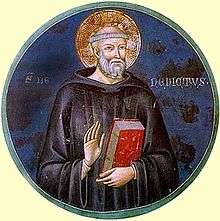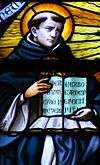Benedict of Aniane
| Saint Benedict of Aniane | |
|---|---|
 | |
| Born |
747 France |
| Died | 12 February 821 |
| Venerated in |
Eastern Orthodox Church Roman Catholic Church |
| Feast | 12 February |
Saint Benedict of Aniane (Latin: Benedictus Anianensis; German: Benedikt von Aniane; c. 747 – 12 February 821 AD), born Witiza and called the Second Benedict, was a Benedictine monk and monastic reformer, who left a large imprint on the religious practice of the Carolingian Empire. His feast day is February 12.
Life
According to Ardo, Benedict's biographer, the saint was the son of a Visigoth, Aigulf, Count of Maguelonne (Magalonensis comes). Originally given the Gothic name Witiza, he was educated at the Frankish court of Pippin the Younger, and entered the royal service as a page. He served at the court of Charlemagne, and took part in the Italian campaign of Charlemagne in 773 where he almost drowned in the Ticino near Pavia while saving his brother. The experience to act on a resolve which had been slowly forming in him, to renounce the world and give himself to the service of God in the monastic life. He later left the court and was received into the monastery of Saint Sequanus (Saint-Seine).[1]
Around 780, he founded a monastic community based on Eastern asceticism at Aniane in Languedoc. This community did not develop as he had intended. In 782, he founded another monastery based on Benedictine Rule, at the same location. His success there gave him considerable influence, which he used to found and reform a number of other monasteries, and eventually becoming the effective abbot of all the monasteries of Charlemagne's empire.[2]
Emperor Louis the Pious entrusted him with the oversight of all the monasteries within his territory. He had a wide knowledge of patristic literature, and churchmen, such as Alcuin sought his counsel.
He was the head of a council of abbots which in 817 at Aachen created a code of regulations, or "Codex regularum", which would be binding on all their houses.[1] Benedict sought to restore the primitive strictness of the monastic observance wherever it had been relaxed or exchanged for the less exacting canonical life. Shortly thereafter, he compiled a "Concordia regularum". Sections of the Benedictine rule (except ix-xvi) are given in their order, with parallel passages from the other rules included in the Liber regularum, so as to show the agreement of principles and thus to enhance the respect due to the Benedictine. He was primarily an ecclesiastic, who zealously placed his not inconsiderable theological learning at the service of orthodoxy, and the cause of Benedictine monasticism.[3] Although these new codes fell into disuse shortly after the deaths of Benedict and his patron, Emperor Louis the Pious, they did have lasting effects on Western monasticism.
Benedict died at Kornelimünster Abbey, a monastery Louis had built for him to serve as the base for Benedict's supervisory work.
Works
- For Benedict's writings, see Codex regularum monasticarum et canonicarum in Patrologia Latina, CIII, 393-702.
- Concordia regularum, ed. Pierre Bonnerue, Corpus Christianorum Series Latina, vol. 168/168A, Turnhout: Brepols 1999.
- Letters, PL 103:703-1380.
Other treatises (PL103:1381ff) ascribed to him are probably not authentic.
References
- 1 2 Kirsch, Johann Peter. "St. Benedict of Aniane." The Catholic Encyclopedia. Vol. 2. New York: Robert Appleton Company, 1907. 11 Feb. 2015
- ↑ Attwater, Donald and Catherine Rachel John. The Penguin Dictionary of Saints. 3rd edition. New York: Penguin Books, 1993. ISBN 0-14-051312-4.
- ↑ Seebass, Otto. "Benedict of Aniane", The New Schaff-Herzog Encyclopedia of Religious Knowledge, Vol. II, (Philip Schaff, ed.)
Bibliography
- Ardo Smaragdus, Life, op. cit., CIII, 353 sqq.;
- Monumenta Germaniae Historica: Script., XV, I, 200-220;
- Acta Sanctorum, Feb., II, 606 sqq.;
- NICOLAI, Der hl. Benedict, Gründer von Aniane und Cornelimünster (Cologne, 1865);
- PAULINIER, S. Benoit d'Aniane et la fondation du monastere de ce nom (Montpellier, 1871);
- FOSS, Benedikt von Aniane (Berlin, 1884);
- PUCKERT, Aniane und Gellone (Leipzig, 1899);
External links
-
 Media related to Benedict of Aniane at Wikimedia Commons
Media related to Benedict of Aniane at Wikimedia Commons - Opera Omnia by Migne Patrologia Latina with analytical indexes (Latin)
